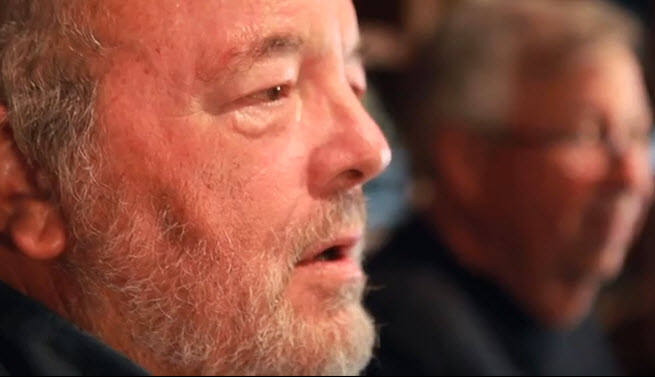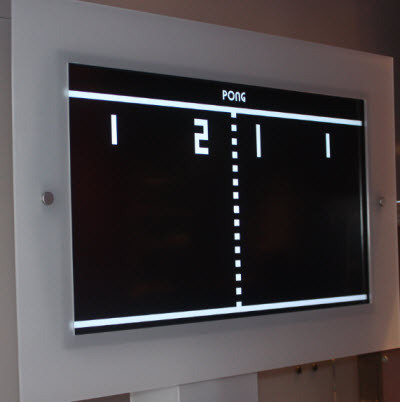GamesBeat: Did you guys think of going to Kickstarter first, or did you try to find funding in other ways?
Alcorn: We’ve been around and talked to angels and VCs and advisers a lot. We thought this time it would be fun—we wanted to do Kickstarter because it’s a new thing. I’m intrigued by the whole process. I’m enjoying doing it. We’re answering questions from people on the Kickstarter.
GamesBeat: The amount you’re asking for is not that much. Is $100,000 just covering the costs of programming and the like?
Alcorn: That’s right. It’s not a get-rich-quick scheme. This is a labor of love for us.
GamesBeat: The Kickstarter is not off to the fastest start. You still have quite a long way to go. What do you think is going to help it right now, beyond just publicity? Do people need to understand it better in some way? Is there an easier way to explain it to them?
Alcorn: I don’t know. I’m new to Kickstarter, so we’ll find out. We’re going to be supporting it and promoting it as best we can. I think it’s really interesting, in that it’s a whole new way of funding companies. I really like it. It’s a lot better than having some angel or venture capitalist giving you his prejudiced opinion. The consumers vote with their dollars. It’s refreshing.
GamesBeat: Going back to your early days, Pong was very successful. Was there any lesson you took out of that for how to approach making games?
Alcorn: How should I put it? It was considered an unwise thing to do because it hadn’t been done before. I was told it wasn’t going to work. All kinds of things were wrong with it. But I learned that when you have a new idea, typically it looks strange to people. So I’m not dissuaded by people telling me that it won’t work. When anybody does something new and creative, something truly different, people object to it — it won’t work, it hasn’t been done before, all kinds of reasons. What happens is one of two things. Either they’re right and you’re going to fail, or you’re on to something. [Laughs]
I guess that’s the big lesson I’ve learned, doing all this innovative stuff over the years. You have to listen to your own heart and do the best you can pushing what you think is right.
GamesBeat: You say you’re doing some engineering. What’s it like to get back into technology in this way?
Alcorn: It’s wonderful. With the creation of new technologies, fundamentally new technologies, that spread the power of computing with the internet and make it ubiquitous everywhere, it’s just an exciting time to be creative. Back when we did Pong, I was the only guy doing it. Now everyone is out there pushing it really hard. There are so many interesting technologies like Siri, broad new technologies that are able to solve problems that we’d forgotten about. It’s a great time to get back into it. I’ve always been involved in electronics. I just haven’t been doing games so much.
GamesBeat: What do you think of modern video games and where they’ve gone?
Alcorn: My overall feeling is that it’s great that it’s a giant industry, but it’s sad that it’s a giant industry too, because of the money and the economics behind it. People can’t afford to take a risk on a game anymore, except when they’re doing it because of a new platform. With the smartphone, it’s easier to get into that. A lot of simple games have been created out there by one or two people.
But the video game industry per se is not something I’m personally terribly interested in participating in. You’re talking about hundreds of millions of dollars to create anything. That’s a scale I can’t deal with. I like to be light on my feet. I want to create something unique and novel. I don’t just want to pour huge amounts of money into something.
It’s sad in a way. Because of all that money in the big games, people get less and less risky. They’re all in about four or five genres. Many of them are follow-ons to a previous game, just to lower the risk. The financial risk is tremendous. I’d rather look into doing something where no one else has gone yet.
GamesBeat: So mobile technology sounds more interesting to you than things in the home?
Alcorn: Yeah. It’s easier to get into, as I said. What are the odds of you creating a new game for the PlayStation? The financial commitment to sell your first one, you’re talking tens of millions of dollars. It’s not something you can take on lightly. The odds of success aren’t in your favor. That sort of scale is not as interesting to me.
GamesBeat: I saw you had a cameo from Nolan Bushnell in the video. Do you guys keep in touch?
Alcorn: Oh, yeah. Absolutely. We like to taunt each other. We’re really good friends. I like to say that I designed Pong, but I never would have done it without Nolan prodding me and lying to me. I was convinced, I’ll confess, that it wasn’t going to sell. I couldn’t imagine how we could build it. He wanted to build 100 machines a day. This is in about a 5,000-square foot shop with about $500 in the bank. “We’re going to go in production? You gotta be kidding me!” But we did it.
He comes up with these crazy ideas and I’ll tell him he’s full of shit. Then I’ll go and do it. [Laughs] For example, the home version of Pong, I was convinced that I couldn’t do it. But I got tired of arguing with him, so I just started doing it with some expert help. God damn it if I didn’t do it.
GamesBeat: Anybody tell you that on this new game that this is a crazy idea?
Alcorn: Not yet, but I’m sure they will. [Laughs] I’m sure they will.
GamesBeat: The last time I saw you, I think, was at the Computer History Museum. You seem to be active in helping them preserve some of this Silicon Valley history.
Alcorn: Yeah. I’m doing that, and I’m also active in a volunteer group called Hack the Future. We’re mentoring junior high school age kids. I want to give something back, because I think all of us hackers had a mentor in some form – a parent, a teacher, a neighbor, something like that. I have to think there are tons of brilliant kids out there who just don’t have access to that, or just don’t know they can do these crazy things. I see it every time we do an event. The kids are just delighted that they’ve written a little game or a web page, or they’ve soldered a kit together. It’s just great.
I’m a big fan of the Computer History Museum and a supporter of it. Obviously, this whole computer revolution has been like the industrial revolution in modern times. It’s had that much impact, if not more. While the old-timers that did it are still alive, we have to capture that history so the next generation will be able to see it and understand how it came to be.
VentureBeat's mission is to be a digital town square for technical decision-makers to gain knowledge about transformative enterprise technology and transact. Learn More



